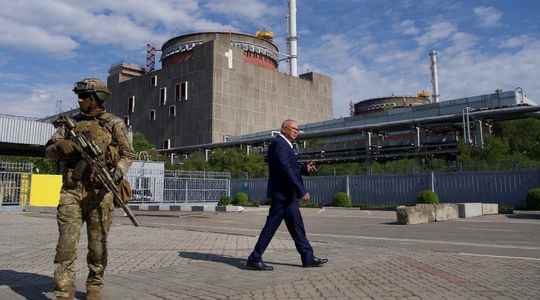“Strikes” a few meters from half a dozen overpowered reactors. Friday, shots were recorded on the site of Zaporizhia, the most powerful nuclear power plant in Ukraine, and in Europe. On the 162nd day of the war in Ukraine, kyiv and Moscow accuse each other, and the world worries again about a nuclear disaster. Further west of the country, the port city of Mikolaiv suffered intense Russian bombing. The Ukrainian authorities believe that “collaborators” are undermining the work of the troops there.
- Zaporizhia nuclear power plant hit again
In March, when the Zaporijia power plant was taken over, the Russian military opened fire on one of the buildings on the site, causing a fire and the turmoil of the international community. The risk of a nuclear catastrophe had suddenly arisen. But the area is again the scene of clashes. “Two strikes” were recorded on Friday. They damaged a high voltage line and triggered the shutdown of one of the nuclear complex’s six reactors.
kyiv immediately denounced these shootings. “Today, the occupiers have created another extremely risky situation for all of Europe: they have twice struck the nuclear power plant in Zaporizhia. Any bombing of this site is a shameless crime, an act of terror”, hammered President Volodymyr Zelensky in his daily video message.
“Despite the provocations of the Russians, the plant continues to operate and supply electricity to the energy system of Ukraine through lines in operation. In accordance with their capacity, it was decided to unload and disconnect one reactors,” said Ukrainian state-owned company EnergoAtom. However, “there are risks of hydrogen leakage and spraying of radioactive substances. The danger of fire is high,” she warned.
The Russian army, for its part, spoke in a press release of “artillery fire” by “Ukrainian armed formations”, both “against the territory of the Zaporizhia power plant and the city of Energodar”, and denounced “acts of nuclear terrorism”. This Saturday, it was still not possible to precisely attribute the origin of these strikes.
- Curfew and manhunt in Mikolaiv
“Honest people have nothing to fear.” On Friday, the governor of the province of Mikolaiv announced a curfew, in place since 11 p.m. (local time) and scheduled to last until 5 a.m. on Monday. The port city has been the target of intense Russian bombardment for several weeks, while some of Putin’s troops have been reassigned to the southwest of the country, according to British intelligence.
With this measure, the governor wants to identify the agents of Russia working on the spot. “We will do what is necessary, including concerning the collaborators” of the Russians, added Vitaliy Kim, in a video posted on his Telegram account. The governor had already promised, in July, a bonus of 100 dollars for information making it possible to identify people who “reveal to the occupants the places of deployment of the Ukrainian troops” or who help them to establish the coordinates of the potential targets of bombardments. Ukrainian forces are currently conducting a counter-offensive in the south, where they claim to have recaptured more than 50 villages that fell from Russian soldiers.
- Russian counter-sanctions pile up
After the British, the Canadians. Russia announced on Friday that it would ban entry into its territory of 62 Canadian citizens. Political and military leaders, priests and journalists persona non grata in response to recent Canadian sanctions targeting Russian personalities.
This decision was taken “in view of the particularly hostile nature of the regime of (Canadian) Prime Minister Justin Trudeau” and in response to actions intended to “insult not only the multinational and multi-faith people of Russia, but also Orthodox believers around the world. “, explained the Russian Ministry of Foreign Affairs in a press release. Last week, 39 British personalities were banned from territory, including former leader David Cameron.
- Gazprom’s arguments on gas deliveries? “Excuses”, according to the European Union.
According to the Russian company Gazprom, Russia is struggling to deliver gas to Europeans because of European sanctions. “An excuse not to supply gas to the European Union,” said the European Commission on Friday, completely refuting the arguments of the gas company.
Gazprom said on Wednesday that the reductions in gas deliveries seen by Nord Stream 1 observed in June and July were due to the blockage of a Siemens turbine essential to guarantee the operation of the gas pipeline. It had been sent to Canada for repair. “Nothing prevents the return and installation of a Siemens turbine in Russia. Everything that is said on the issue is false,” said spokesman for the European executive Eric Mamer. “Nord Stream 1 is not subject to EU sanctions,” he said.
